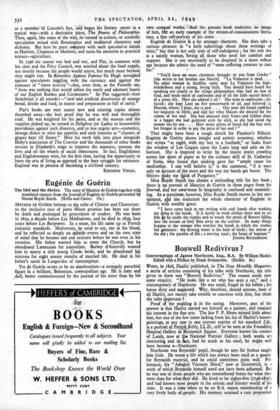Eugenie de Guerin
MAURICE DE GuERIN belongs to the tribe of Chenier and Chatterton: to the exclusive race of poets ,fv`hose promise has been cut short by death and prolonged by generations of readers. He was born in 181o, a decade before Les Meditations, and he died in 1839, four years before Les Burgraves. In a sense, his life came up to French romantic standards. Misfortune, he used to say, ran in his blood, and he reflected so deeply on outside events and on his own state of mind that he became sad and taciturn before he was even in his twenties. His father wanted him to enter the Church, but he abandoned Lamennais for journalism. Barbey d'Aurevilly wanted him to marry a rich young Creole bride, and he abandoned his mistress for eight uneasy months of married life. He died in his father's castle in Languedoc of consumption.
Yet de Guerin seams to be an anachronism—a strangely parochial figure in a brilliant, Bohemian, cosmopolitan age. lie is inert and dull, better commemorated by the journal of his sister than by his
own unequal works r And the present- book enshrines no image of him, but an early example of the stream-of-consciousness litera- ture, a fine self-portrait of his sister.
Eugenie de Guerin Is a far stronger character. She does take a curious pleasure in " a little subterfuge about these writings of mine," but that is her only trait of self-indulgence ; for the rest she is a saintly woman, loving all those who need her comfort and support. She is not necessarily to be despised in a 'more robust age because she admits the need of " some suffering creature to care for."
" You'll have no more chestnuts brought to you' from Cordes " [she writes to her brother one March]. " La Vialarette is dead. . . . No other woman in Andillac came near La Vialarette for_ high- mindedness and a strong, loving faith. You should have heard her speaking out clearly to the village philosophers who had no fear of God, and made mock of confession and of all the little sacred details of a pious life. How she adored it all ! She went to confession ; she fasted ; she kept Lent on five pennyworth of oil, and believed in Heaven, where, I hope, she is now... . Our poor old friend confided her bequests to Mimi, and told her what Masses she desired for the repose of her soul. She had amassed sixty francs and hidden them in a faggot she had gathered stick by stick, as she had saved the money sou by sou. . . . How many pieces of bread did she buy with her hunger in order to pay the price of her soul ? "
That might have been a rough sketch for Flaubert's Felicite. Eugenic de Guerin shows insight and artistic economy, whether she' writes " at night, with my feet in a footbath," or looks from the window of Les Coques upon the Loire long and pale on the horizon. She is inspired to write by the tiniest insect crawling across her sheet of paper or by the culinary skill of St. Catherine of Siena, who found that cooking gave her " ample cause for meditation. I can well belielie it," is the comment, "if it were only on Account of the stove and the way my hands get burnt. The blisters make me tbink of Purgatory."
Miss Itoide Smith has chosen a misleading 'title for her book ; there is no portrait of Maurice de Guerin in these pages from the fournal, and her own essay In biography is confused and unsatisfy- ing. As a translate?, however, Miss Royde Smith moves in her own element, aid she enshrines the whole character of Eugenie de Guerin with notable grace.
X have come back to my writing with cool hands after washing my dress in the brook. It is lovely to wash clothes there and to see fish Eo by under the ripples and to watch the petals of flowers falling into the stream as- they float away on the current. So many things happen to the woman who watches the brook in which she washes her garments: the flowing water is the bath of birds ; the mirror of the sky ; the parable of life ; a moving road ; the fount of baptism"
JOANNA RICHARDSON.


































 Previous page
Previous page